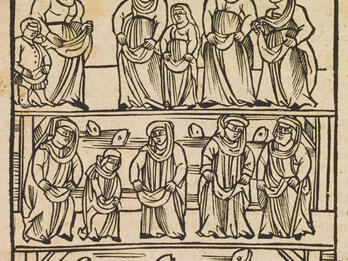Seder nashim (Order of Women): On Welcoming the Sabbath
Sabbath Eve
Near sunset one shall light a Shabbat candle and before saying the blessing it is necessary to say “I am not receiving Shabbat” even if one already lit it, until it is Shabbat.
And then one shall say:
Blessed are You O Lord our God
King of the World who sanctified us in His commandments
and commanded us to light the Shabbat candle.
And do not add more words.
And then one shall light it.
And if it will be necessary to remove the candle from the place where it was lit once it goes out, one must say “I am putting this candle here with the intention of removing it tomorrow.”
And even if one lights twenty candles, one shall not say more than a single blessing.
And by being conscientious about this mitzvah a woman will atone for the sin she committed with the first man Adam who was the candle of the world and she extinguished it and in addition she will have much good fortune.
And welcome Shabbat early when there is still some small amount of sunlight. [ . . . ]
Kiddush for Sabbath Eve
[ . . . ] And one shall drink most of it.
And then one shall wash one’s hands and if one washes oneself as we said above, one shall say the blessing.
And one shall uncover the loaves of bread.
And one shall take both of them in one’s hands and say the Brings Forth Bread from the Earth [blessing] as it appears above.
And one shall break one of them and eat supper and afterwards shall say the blessing as it appears below.
Although this is no place to discuss special laws and especially those for Shabbat which are endless, we shall still not fail to mention one that many women are said to sin, by violating with regard to cosmetics, because they remove their makeup and put makeup on, along with rouge, and a woman who seems to not be doing anything wets a piece of cloth with water from the pitcher to rub onto herself, and in the days when the laws of Israel were enforced, the punishment was no more than stoning anyone who did this and although they are no longer punished through such justice, they might, heaven forbid, be punished from above in other ways that make stoning seem like nothing by comparison, because when justice is not done below it is done above.
Therefore if, heaven forbid, she is killed or dies prematurely then her mother who had her wear cosmetics can know for certain that this sin was the reason and her blood will be demanded for it twice, the first time for killing a soul and the second because it was her daughter’s.
And all things can be remedied because, if they would look for types of cosmetics that although applied Friday afternoon will last through the Sabbath, they will find them.
Credits
Meir Benveniste, “Erev Shabat: Çerka de la puesta de el sol açendera kandela (On Welcoming the Sabbath),” in Seder Nashim (Order of Women), ed. Meir ben Samuel Benveniste (Salonika, ca. 1565), 4–7 (MS 99 A 681, National Library of Israel, Jerusalem; https://www.nli.org.il/he/books/NNL_ALEPH990018080890205171/NLI). Republished as: Seder Nashim: Sidur tefilah be-Ladino Saloniki, ha-me’ah ha-shesh ʻesreh, ed. Ora Schwarzwald and Aldina Quintana Rodríguez (Jerusalem: Ben Zvi Institute, 2012), pp. 91–98.
Published in: The Posen Library of Jewish Culture and Civilization, vol. 5.



